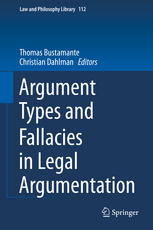

Most ebook files are in PDF format, so you can easily read them using various software such as Foxit Reader or directly on the Google Chrome browser.
Some ebook files are released by publishers in other formats such as .awz, .mobi, .epub, .fb2, etc. You may need to install specific software to read these formats on mobile/PC, such as Calibre.
Please read the tutorial at this link: https://ebookbell.com/faq
We offer FREE conversion to the popular formats you request; however, this may take some time. Therefore, right after payment, please email us, and we will try to provide the service as quickly as possible.
For some exceptional file formats or broken links (if any), please refrain from opening any disputes. Instead, email us first, and we will try to assist within a maximum of 6 hours.
EbookBell Team

4.8
84 reviewsThis book provides theoretical tools for evaluating the soundness of arguments in the context of legal argumentation. It deals with a number of general argument types and their particular use in legal argumentation. It provides detailed analyses of argument from authority, argument ad hominem, argument from ignorance, slippery slope argument and other general argument types. Each of these argument types can be used to construct arguments that are sound as well as arguments that are unsound. To evaluate an argument correctly one must be able to distinguish the sound instances of a certain argument type from its unsound instances. This book promotes the development of theoretical tools for this task.